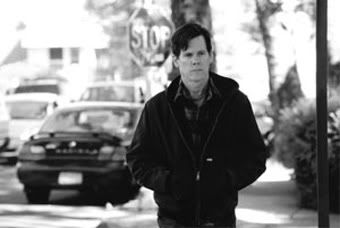The Woodsman -- the most hauntingly brilliant film of '05.

Kevin Bacon's gritty portrayal of a pedophile in The Woodsman
Have you ever watched a film which left you thinking about it for days?
Walter is introduced as a criminal on parole. If crimes could be rated, his would be deemed worse than murder because they were illicit acts against children. With a theme as taboo as it gets, I thought it was handled with such sensitivity and flair. The characters were all carefully crafted to move the simple plot along so that at points we were subtly made to actually sympathise, if not separate the misdeed from the doer. His weakness was presented not so much as an excuse but a representation of unresolved baggage from a childhood which could very well be anyone's given the circumstances of poverty and emotional depravation.
The film also boldly poses the possibility that the juvenile victims may often consent, perhaps not the same way an adult would in a sexual context, but as a result of their own personal experiences of abuse or neglect. That is something we often overlook because it seems 'logical' that a child in such a situation is innocent and is beguiled by the offender. But as a scene is played out between the two, when he asks, "Would you like to sit on my lap?", the potential 'victim' pauses and replies, "Would you like me to sit on your lap?" and she does so not with lewd consent but only because in her skewed notion of what is socially acceptable since her own father had violated her in that manner.
Which brings me to what is brilliant about the film. First up, it does not attempt to pontificate or show up who 'the bad guy' is. It simply presents a spectrum of what 'evil' is -- from what is deemed socially wrong and hence a crime; to the bigotry and hypocrisy of humanity which is potentially damaging, if not treacherous. We can arrest someone for committing a crime, but we can't incarcerate another for hurting a life through gossip and moral condemnation.
Employing the symbolism of The Woodsman is also ingenious because not only does it describe the protagonist's vocation in a lumberyard, it also alludes to the character in Little Red Riding Hood who saves her from the Big Bad Wolf, and if some of us recall, that fairytale is perhaps also a fable about strangers who violate the trust of little children. Ironically, Walter's character should logically be the wolf, but instead he finds his apparent "cure" or redemption when he attacks another predator like himself, which in Jungian perspective would be his alter-ego and hence himself.
Ultimately everyone in the film is flawed, as is the human condition. From Walter to his co-workers' mysoginy or vindictiveness, his family's morally superior indignation, to his parole officer's self-righteous arrogance and even his potential victim's misguided values. And that's what makes the film so completely real. Because as Thackeray once said, "The world is a looking-glass and gives back to every man the reflection of his own face."